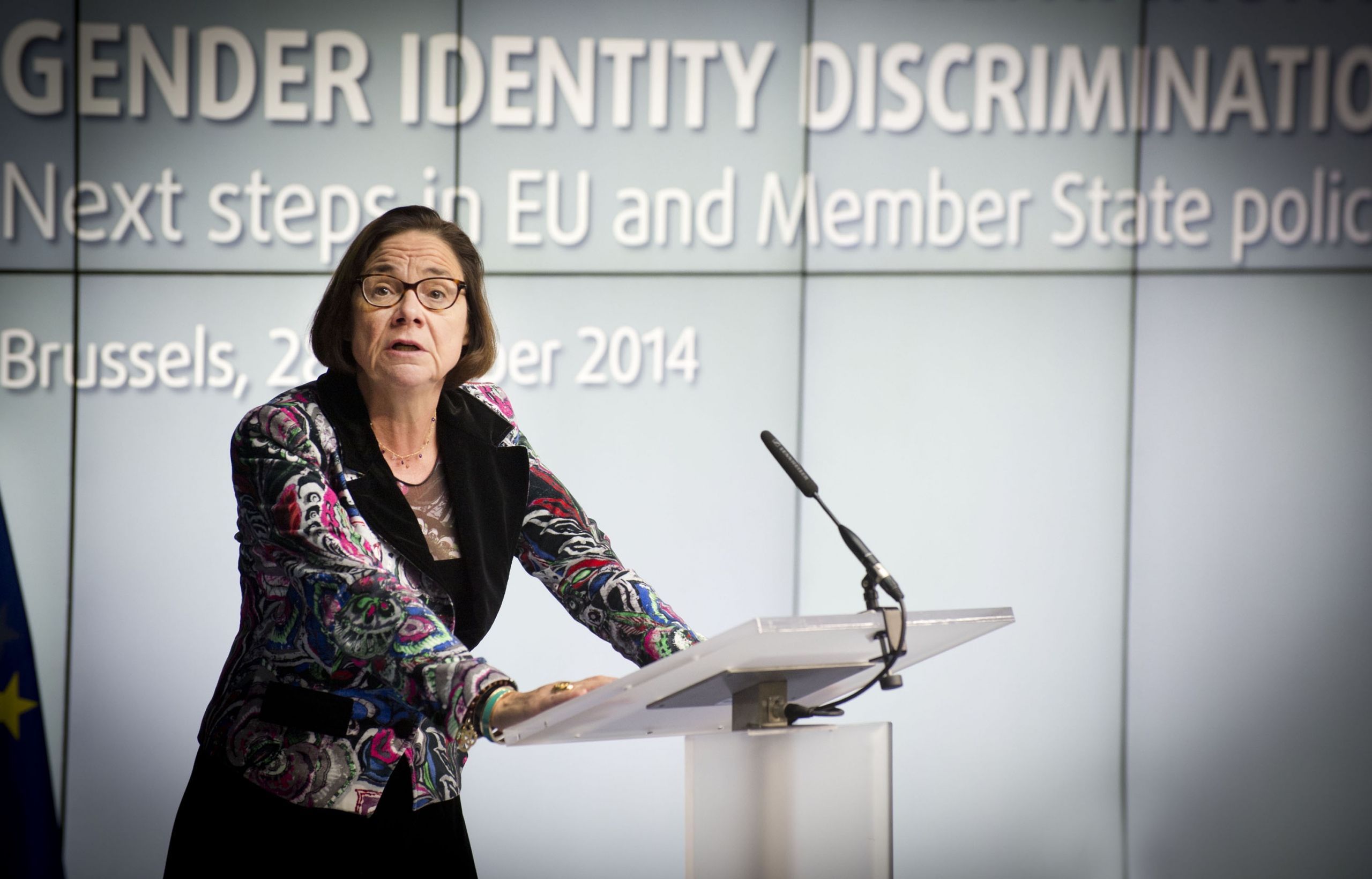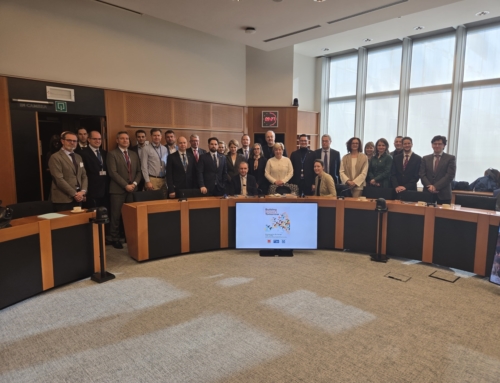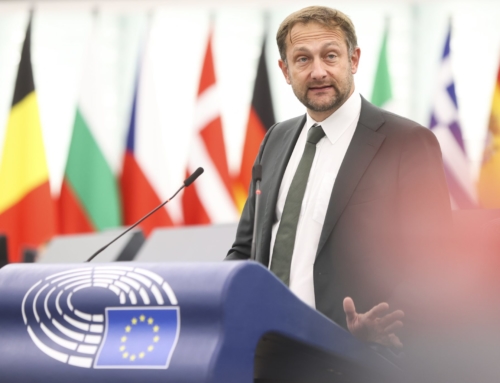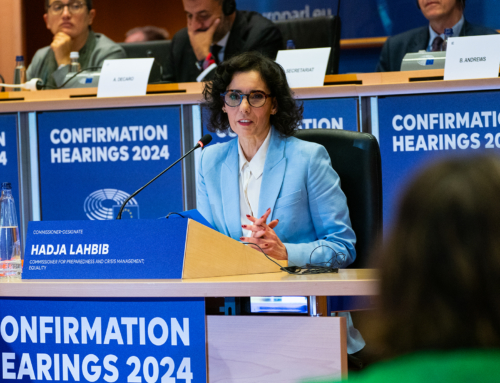On 28 October the Italian Presidency of the EU in cooperation with the EU Agency for Fundamental Rights (FRA) and the General Secretariat of the EU Council hosted a high-level conference on “Tackling sexual orientation and gender identity discrimination: next steps in EU and Member State policy making”.
Following the conference ILGA Europe’s Director Evelyn Paradis stated “There is a clear sign of mounting support for the EU strategy on LGBTI rights. Additionally, we witnessed positive signs supporting the unblocking the proposal for the EU comprehensive anti-discrimination directive.”
Outgoing Commissioner for Justice Martine Reicherts
At the opening of the conference the outgoing Commissioner for Justice, Martine Reicherts, giving her last public speech as Commissioner expressed support for the “LGBT Rights agenda” promoted by ILGA Europe which is heavily funded by… the European Commission. Referring to the horizontal antidiscrimination directivewhich is currently blocked at the Council, Mrs Reicherts suggested changing its legal basis. “With the current legal basis, Article 19 of the Treaty on the Functioning of the European Union, the proposal requires unanimity in the Council. Hence all it takes is a small number or even just one Member State opposing the text – and everybody is absolved from even having to engage in a serious discussion.
I would like to see governments take a position. At the same time, you cannot force Member States to agree to something. That is a fact we have to live with.Therefore I personally believe one way forward could be a change of the legal basis that would allow a group of Member States to go ahead and adopt the directive under enhanced cooperation.” In other words, Mrs Reicherts suggested leaving some Member States aside in order to push for an advancement of the LGBT agenda in the EU.
However, three Governments represented at the conference, namely Germany, Ireland and Croatia, did not follow Mrs Reicherts’ suggestion. When asked about their opinion of changing the legal basis none of them expressed support for such a move. Asked whether enhanced cooperation should replace unanimity as the legal basis Aodhán Ó Ríordáin TD, Irish Minister of State for New Communities, Culture and Equality, insisted on the common ethos of the EU which he considers is one of collectivism. He stated that the EU is a collection of countries that have a common goal. Hence shifting from unanimity among all Member States to enhanced cooperation among a few Member States would not be an appropriate solution.

Caren Marks, German Parliamentary Secretary of State, Federal Ministry for Family Affairs, Senior Citizens, Women and Youth; Aodhán Ó Ríordáin TD, Irish Minister of State for New Communities, Culture and Equality; Sandra Artuković Kunšt, Croatian Deputy Minister of Justice
Caren Marks, German Parliamentary Secretary of State, Federal Ministry for Family Affairs, Senior Citizens, Women and Youth reacted similarly and stated that she thought “it worthwhile to negotiate further”. Sandra Artuković Kunšt, Croatian Deputy Minister of Justice, agreed with both Mr Ó Ríordáin and Mrs Caren Marks.
Western Europe vs Eastern Europe? Money vs popular expression?
“It is important to put pressure on the countries that did not yet recognise civil partnerships or same sex marriage”. These were the words of a Romanian MP, Remus Cernea, present at the conference that brought attention to the role that pressure from the EU and the United Nations plays. Nevertheless, recent evolutions in several eastern European countries such as Croatia and Slovakia show that the majority of citizens in these countries do not support the LGBT Agenda. This agenda is strongly supported by national Governments in several western European states that pour money into projects via institutions such as the Council of Europe where the Sexual Orientation and Gender Identity Unit is financed by a small group of Member States. Likewise, these Governments invest money beyond the European continent to support the LGBT agenda.
In parallel with the conference in Brussels another conference took place in Mexico, namely ILGA’s 27th World Conference. Several western European states supported this event: Germany, Finland, the Netherlands, Norway, and Sweden. The theme of this conference was “De-colonizing our bodies”. Tlazoltéotl, a Huasteca goddess was chosen as a symbol for the conference: “representing transformation, lust, sins and filth; we have chosen her for her transgressiveness, a force to empower us to transform the world.”
The speakers at the conference in Mexico included several European politicians such as the Polish Member of Parliament Robert Biedroń who is a strong advocate for the LGBT agenda at the Parliamentary Assembly of the Council of Europe and Ulrike Lunacek, Austrian Vice President of the European Parliament. A former Dutch politician, known as “the father of gay marriage” in the Netherlands, Boris Dittrich, currently working for Human Rights Watch as Director of the “Lesbian, Gay, Bisexual, and Transgender Rights Program” also intervened. The latter has publicly stated that group marriage is the next step after same sex marriage.
The strong support from western European countries on these issues illustrates the widening gap on the European continent between political visions of human sexuality and family, between the East and the West, between citizens and well-funded lobbies.
This week the Italian EU Presidency has paved the way for the LGBT Agenda at the EU Council. How will the next EU Presidency, Latvia, act? Will the popular expression that is growing across Europe in favour of natural family reach the political decision makers of the EU? The new EU mandate will tell…
The reaction of the Irish, German and Croatian ministers show that the LGBT Agenda is a highly sensitive issue on which there is no common position among the EU Member States. Listening to citizens and not only to lobbies would be a wise thing for the European decision makers to do. Most EU citizens would most likely not identify with the spirit of the Huasteca goddess Tlazoltéotl, mentioned above, who represents “sins and filth”…







